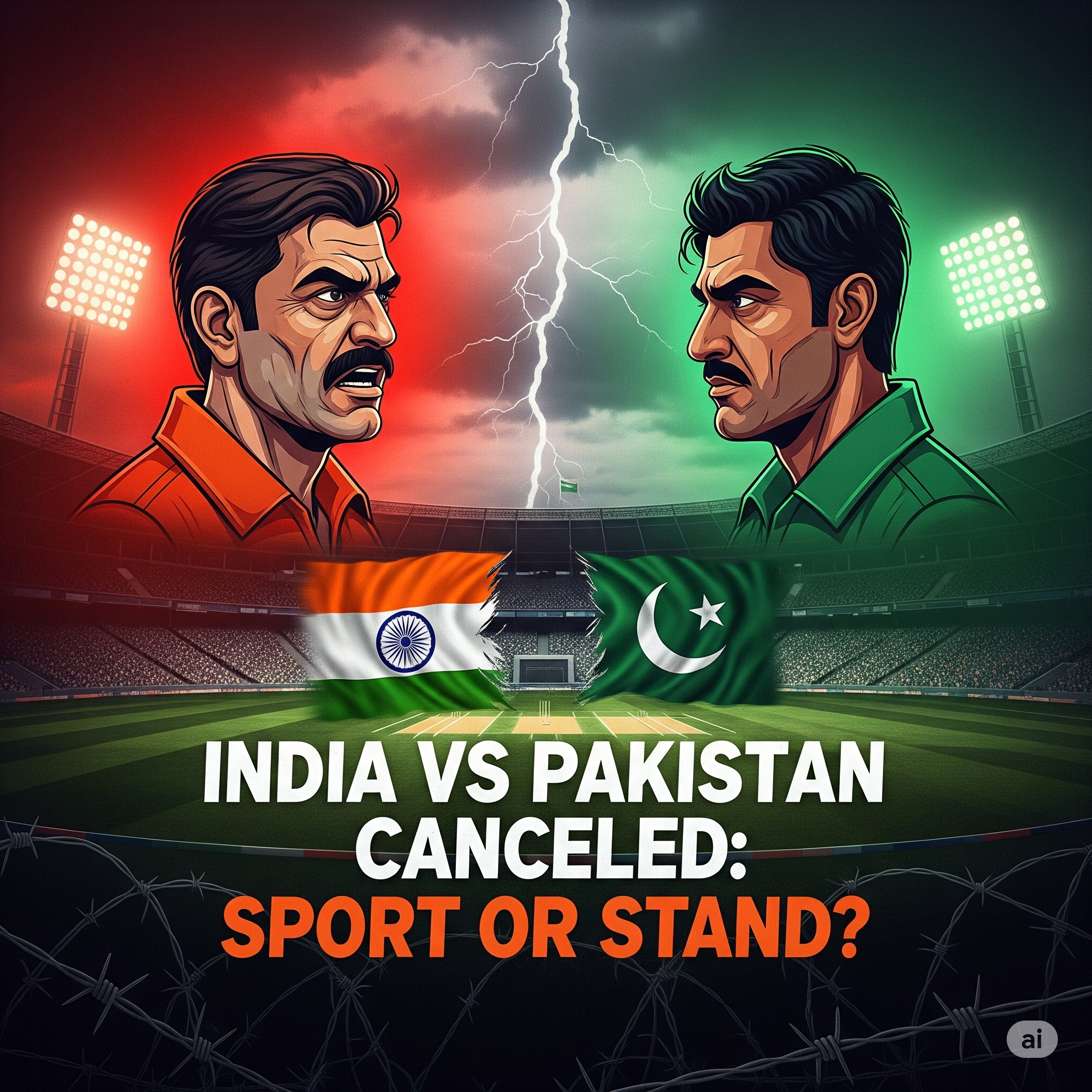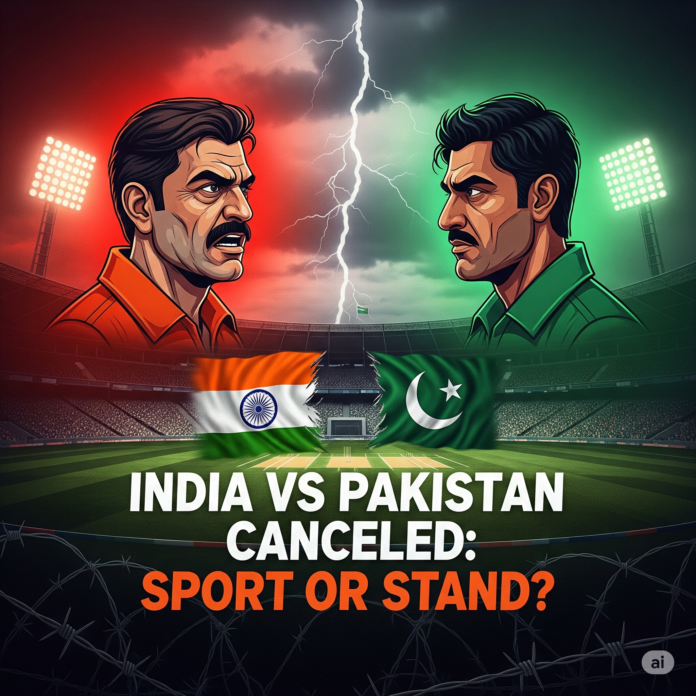
In what began as a sporting fixture but quickly turned into a geopolitical flashpoint, the India vs Pakistan match at the World Championship of Legends (WCL) was called off after a wave of Indian player withdrawals. What followed was a storm of reactions—some measured, some fiery—from former Pakistani cricketers and fans, warning India that such actions could cast a shadow over future cricketing relations, including at ICC tournaments like the World Cup.
At the center of the controversy is a simple question with far-reaching implications: Should sports be insulated from political tensions? Or are they destined to be swept up in the waves of nationalism and public emotion?
🏏 The Fallout: A Match That Never Happened
The now-cancelled legends match was scheduled for July 20 in Birmingham, part of the WCL 2025 tournament, featuring retired cricket icons from several nations. India vs Pakistan, even in retired form, draws global attention—and packed stadiums.
But this time, the game didn’t even make it to the toss. One by one, high-profile Indian legends began withdrawing from the squad in protest over strained diplomatic relations with Pakistan, intensified by recent violent incidents in Kashmir. Former stars like Yuvraj Singh, Harbhajan Singh, Irfan and Yusuf Pathan, and Suresh Raina announced they would not participate, citing national sentiment and public backlash.
Their stance was reinforced by EaseMyTrip, a prominent Indian travel brand and WCL sponsor, which openly refused to support any match involving Pakistan. Facing mounting pressure and empty Indian benches, WCL organizers officially called off the clash and issued an apology, acknowledging that the match had “hurt public sentiments.”
💬 Voices from Pakistan: “Don’t Just Walk Away from This”
As news of the cancellation broke, it drew sharp responses from former Pakistani cricketers who saw India’s move as selective and politically charged.
Former captain Salman Butt was especially outspoken, calling India’s withdrawal hypocritical unless they take that same stance into official international tournaments. In a video message shared widely on social media, Butt remarked:
“If you are walking away from us in this tournament, then you better make a promise—don’t play against us in the World Cup either. You’ve made a statement here. Stick to it. We won’t forget this.”
His words struck a chord with many in Pakistan who have long accused India of using bilateral cricket ties as a political tool, reviving debates about whether India should face Pakistan in ICC events at all.
Adding to the frustration was former fast bowler Abdur Rauf, who criticized Indian players for being “selectively principled”—interacting with Pakistani players off the field but refusing to face them on it.
“You pose for pictures, share laughter, and attend events together. But when it’s time to walk out on the field, suddenly it’s unpatriotic? The inconsistency is baffling.”
🌐 The Bigger Picture: When Cricket Reflects a Nation’s Pulse
India-Pakistan cricket matches have always transcended the boundary lines—they’re events of immense cultural, emotional, and political magnitude. Whether it’s the high-octane thrill of a World Cup game or the nostalgia of legends squaring off, these games carry a gravity few sporting rivalries can match.
But the recent WCL fallout shows just how fragile these moments are in today’s climate. Indian players, many of whom have also served in the armed forces or openly supported national defense causes, found themselves under enormous pressure from fans and social media influencers not to “normalize” ties with Pakistan, especially after recent terror-related incidents.
And this wasn’t just noise. Online campaigns called for boycotts, major brands distanced themselves, and eventually the players took a stand.
🎯 Looking Ahead: What Does This Mean for the World Cup?
With the ICC Men’s Cricket World Cup scheduled for early 2026, questions loom large:
- Will India uphold this unofficial boycott at the biggest cricketing stage?
- Could this pressure lead to India pulling out of Asia Cup matches involving Pakistan, as has happened before?
- And if so, how will the International Cricket Council (ICC) respond?
Pakistan’s cricket board is reportedly already facing financial setbacks due to uncertainty around India’s participation in upcoming tournaments. A withdrawal from the Asia Cup or World Cup clash would likely result in tens of crores in lost revenue and possibly even push broadcasters to seek reassurances or compensation.
🧭 What Stakeholders Are Saying
- Indian Government: So far, there’s been no official direction to boycott cricket matches with Pakistan. However, government officials have reiterated that “security and sentiment” will always guide participation decisions.
- BCCI: The Indian cricket board has remained tight-lipped but is closely monitoring public and political sentiment. Previous ICC events have seen India-Pakistan fixtures relocated to neutral venues under similar pressures.
- Fans: Reactions are polarized. While many Indian fans supported the withdrawals, some lament the growing politicization of sports, yearning for a time when cricket served as a rare bridge between two hostile neighbors.
⚖️ Final Thoughts: Sports or Statecraft?
The WCL cancellation isn’t just about retired cricketers missing a game. It’s a mirror reflecting the deeper and ongoing conflict between national identity, public sentiment, and the hope that sports can exist—even briefly—beyond the reach of politics.
As things stand, Pakistan’s former players have thrown down a challenge: If India’s stance is truly principled, let it extend to the global stage. And if not, was this gesture just symbolic?
Cricket fans, especially those who grew up watching legendary duels like Tendulkar vs Shoaib or Dhoni vs Afridi, may find themselves caught between nostalgia and nationalism.


